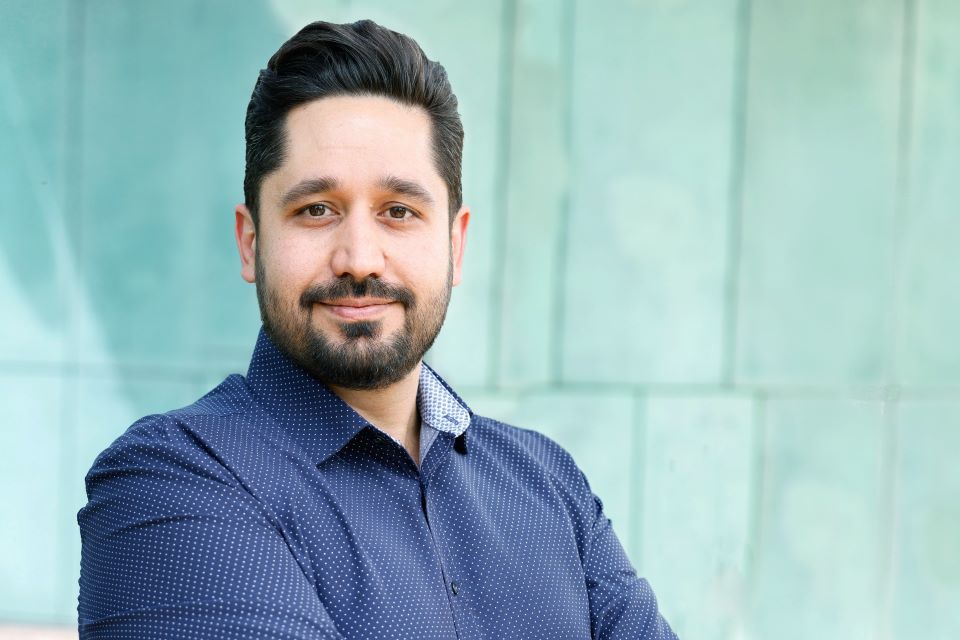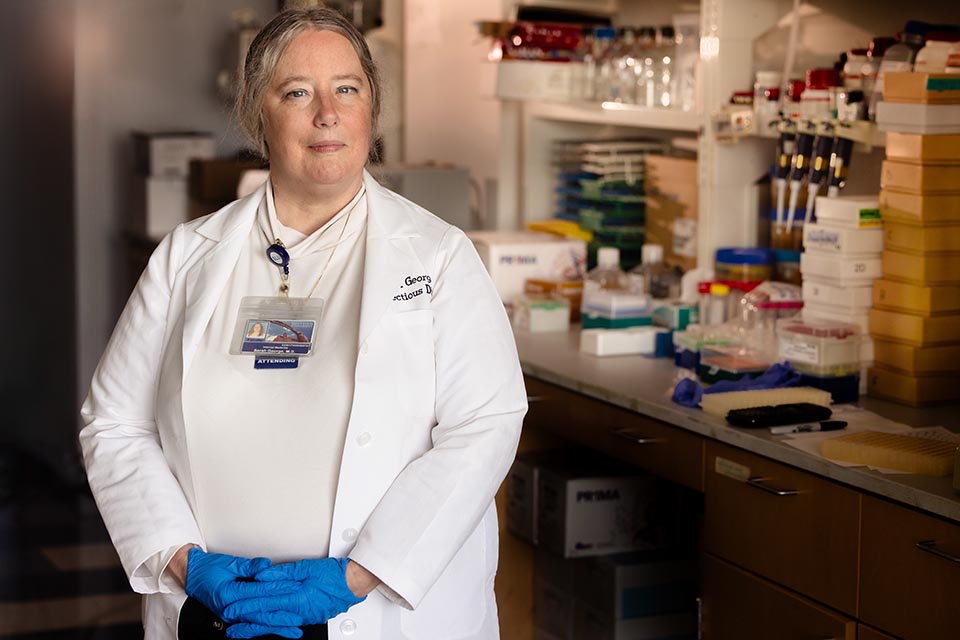SLU Computer Scientist Part of Collaborative to Help Improve Public Safety, Disaster Response Networks
ST. LOUIS – A three-year, $1 million grant from the National Science Foundation will fund work at Saint Louis University (SLU), New Mexico State University (NMSU) and the University of Missouri – St. Louis (UMSL) to improve networking and security challenges in next-generation public safety and disaster response networks.

Reza Tourani, Ph.D., is an assistant professor of computer science at Saint Louis University. Photo by Sarah Conroy.
The grant, “RINGS: Resilient Edge Ecosystem for Collaborative and Trustworthy Disaster Response (REsCue),” was awarded a five-person research team led by Satyajayant Misra, Ph.D., professor of computer science at NMSU. Reza Tourani, Ph.D., assistant professor of computer science at Saint Louis University, is a co-principal investigator.
The research team also includes Roopa Vishwanathan, Ph.D., assistant professor of computer science at NMSU; David Mitchell, Ph.D., assistant professor of electrical and computer engineering at NMSU; and Abderrahmen Mtibaa, Ph.D., assistant professor of computer science at UMSL.
Tourani said the team began working together when he was a graduate student in Misra’s Network and System Optimization Laboratory at NMSU and has collaborated since.
The project will address networking and security challenges in next generation public safety and disaster response networks, where mission-critical emergency operations need to be performed with limited surviving infrastructure, potentially augmented with diverse devices deployed by first responders.
“When we have a natural disaster or a mass-casualty event, first-responders and the helpers need to be able to securely communicate with one another,” Tourani said. “We want to improve the systems in which all different agencies can communicate better when response time and safety are critical.”
The project identifies the fundamental architectural and security challenges in fragmented networks, such as seamless multi-modal communications, resilient and verifiable computing, and trust management, and addresses them for viable deployment in disaster-response scenarios.
In addition to security, the project will also address the need to improve communication in areas where cellular and computer networks are not as built out – like a dense forest or rural area with limited bandwidth.
The network design will be a generic blueprint to design an edge-centric, trustworthy, and resilient named data networking architecture. The project aims to:
- Increase the effective integration of diverse autonomous networks (e.g., utilities and smart homes) into a resilient, cooperative, and secure network-of-networks;
- Create system for supporting network operations during broad disruptions including the enforcement of access control to data and services, and
- Create an efficient verification of untrusted users’ communications.
The grant will allow the research team to provide new research outcomes in networking, near-user computing, low-latency wireless communications, and cybersecurity.
“We want to create networks that can tolerate the disruptions that come from things like tornados and hurricanes,” Tourani said. “By creating disruption-tolerant networks, we can move beyond effective emergency response uses to rural networking.”
The project also investigates foundational resilience challenges including engendering trust without a centralized certificate authority in a network stitched-together from independent network fragments, providing flexible and revocable access control and authorization for data/services, and ultra-reliable low latency wireless communications in challenging environments.
“As we see more and more severe weather incidents and other events in which multiple emergency management systems need to work seamlessly together and with members of the public who can volunteer in a time of need, a secure network that can work through disruptions is vital,” Tourani said.
National Science Foundation
The National Science Foundation (NSF) is an independent federal agency created by Congress in 1950 to promote the progress of science; to advance the national health, prosperity, and welfare; and to secure the national defense. With an annual budget of $8.8 billion, the NSF is the funding source for approximately 27% of the total federal budget for basic research conducted at U.S. colleges and universities. In many fields such as mathematics, computer science and the social sciences, NSF is the major source of federal backing.
Saint Louis University
Founded in 1818, Saint Louis University is one of the nation’s oldest and most prestigious Catholic institutions. Rooted in Jesuit values and its pioneering history as the first university west of the Mississippi River, SLU offers nearly 13,000 students a rigorous, transformative education of the whole person. At the core of the University’s diverse community of scholars is SLU’s service-focused mission, which challenges and prepares students to make the world a better, more just place.
Latest Newslink
- SLU Professor Says Statistics Is the Everyday Math Everyone Needs to KnowR. Lauren Miller, Ed.D., assistant professor of mathematics and statistics at Saint Louis University, argues that a solid foundation in statistics provides people with numerical literacy and reduces math anxiety. Miller will present “A Case for High School Statistics” at the Curiosity by TEDx St. Louis event on Saturday, May 31, at the Missouri History Museum.
- SLU Professor's Taco Fundraiser to Support Tornado Relief EffortsSaint Louis University chef Daniel Brewer, MS, RDN, is hosting a special fundraising event at his home this weekend featuring an innovative taco menu that draws from a variety of global influences. Proceeds will benefit Action St. Louis.
- Saint Louis University Vaccine Center Recruits Healthy Participants for Flu Human Challenge StudyStudy participants will be infected with the influenza virus while under the care of a medical team in order to learn more about how healthy people’s immune systems respond to an influenza infection.
- SLU/YouGov Poll: Missouri Voters Sweet on Kansas City BBQIn February 2025, the SLU/YouGov Poll asked 900 likely Missouri voters which regional style of American barbecue was their favorite. Kansas City style came out on top, with 41 percent of voters selecting it as their favorite barbecue style, more than double the 17 percent who favored St. Louis style.
- SLU President Tells Class of 2025 to Enjoy the JourneySaint Louis University President Fred P. Pestello, Ph.D., never planned on a career in higher education. During his commencement address Saturday morning in front of a packed crowd at Chaifetz Arena, Pestello said that when he was the one graduating from college 51 years ago, he wanted to be a radio host. Along the way, things changed, and he ended up having a lengthy career in education. As he prepares to step down as SLU's 33rd president at the end of June, he told the Class of 2025 about how his plans changed early and often.
- SLU Vaccine Center Will Enroll Healthy Volunteers in West Nile Virus Clinical TrialSaint Louis University's Center for Vaccine Development will enroll up to 30 adult volunteers in a clinical trial to study the safety and immune response elicited by a new investigational vaccine for West Nile virus. Currently, there is no approved vaccine or treatment for illness caused by West Nile virus. A previous study of an earlier version of this vaccine showed the vaccine was safe and well-tolerated. Building on these findings, this new study will assess an updated version of the vaccine.













